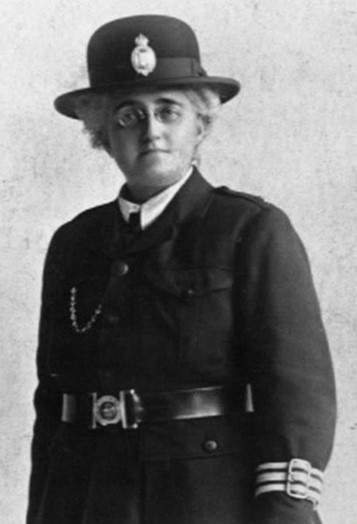
Olivia Hennessy
To wrap up Women’s History Month, I would like to discuss a woman with a close-to-home connection. Grantham is my home town, with many recognised heritage sites and connections to well-known individuals. But has anyone heard of Edith Smith? She was the first woman police constable to gain the full powers of arrest in the UK, for her work in Grantham.
It’s worth pausing to consider the implications for women who came into contact with the law at a time when there were no female officers. Through the Victorian and Edwardian periods, women were cleared from court rooms during sexual assault cases, there was an extremely low conviction rate for sexual offenders and women convicted of crimes were treated extremely harshly. Organisations such as the British Women’s Temperance Association began to agitate for an improvement, including the need for women police ‘matrons’ to protect women accused and convicted of crimes.
As with so many other aspects of women’s struggle for social equality, the First World War proved important: in return for their participation in the war effort, they won concessions. One of these was the foundation in 1914 of the Women’s Police Service in London – to fill the roles of men who were away at the front. This gave Edith Smith the opportunity to take on a full-time policing role. Born in Birkenhead in 1876, she married in 1897 but a decade later was already widowed with four children to support. She moved to London and trained as a nurse and midwife. She joined the WPS and was posted to Grantham, the first county town to form a branch of the WPS.
In 1915, Smith’s post became an official, paid one, at £1.40 per week. For the remainder of the war, she served in Grantham. A substantial part of her job involved visiting families of girls considered to be at risk of prostitution and ensuring compliance with a wartime curfew imposed on women. Both duties were related to the fact that there were significant numbers of army recruits being trained near the town. How to regulate relations between them and Grantham women became a huge issue locally. In 1917 Smith was granted powers of arrest – the first woman Police Constable to gain this power. One researcher has remarked, ‘whether female police officers were there to protect women from men, or vice versa, is a moot point’. However, what is beyond doubt is that Grantham was the site of a key contest over rights of association between army men and civilian women, and women like Smith were mobilised to regulate these rights.
After the war, Smith returned to Halton, near Liverpool, and nursing. Her life could not have been easy and she took her own life in 1923. She was buried in an unmarked grave. In more recent years, as part of the centenary commemorations of the First World War, she has found renewed recognition. Merseyside police erected a proper headstone on her grave in 2018, and there are plaques dedicated to her memory on the Lincolnshire Police Headquarters at Nettleham, at Halton and in Grantham. There is also a street called Edith Smith way in Grantham, and the Grantham Museum mounted an exhibition on her life and career in 2018.
References:
Alison Woodeson, The first women police: a force for equality or infringement? Women’s History Review, 2, 2, 1993, pp 217-232. https://www.tandfonline.com/doi/pdf/10.1080/09612029300200025?needAccess=true
Grantham Civic Society. ‘PC Edith Smith’. Accessed 25th March 2021. http://www.granthamcivicsociety.co.uk/public/plaque_smith.php
BBC. ‘World War One at Home’ (4th February 2014). Accessed 25th March 2021. https://www.bbc.co.uk/programmes/p01rp7g6